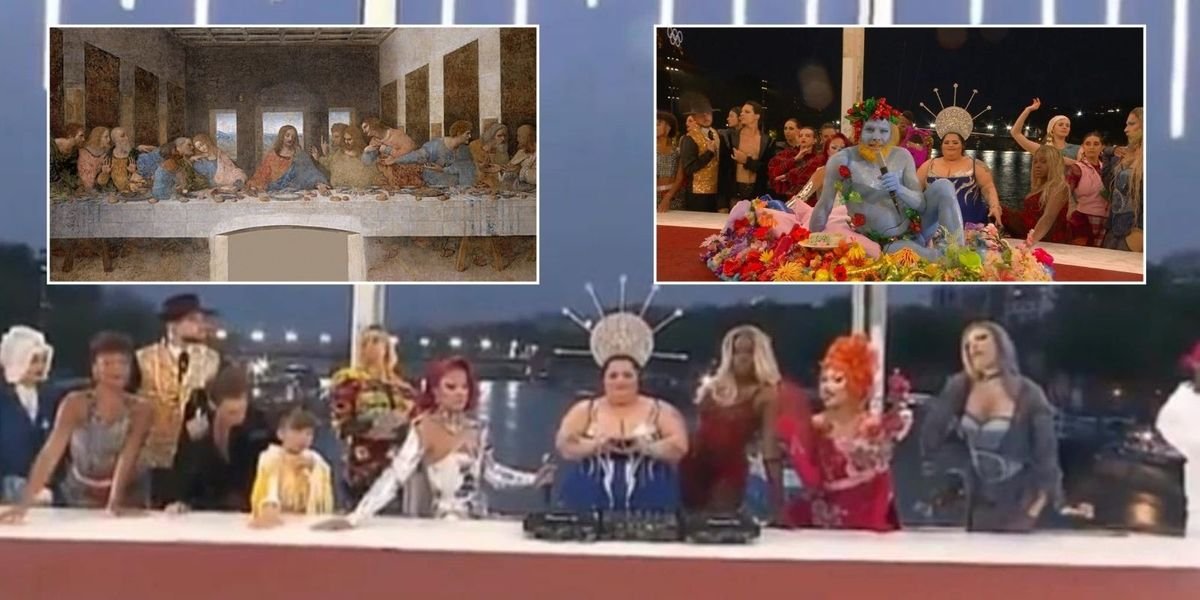## ‘Attack on Christianity!’ 😡 Fury as Paris Olympics Reimagine The Last Supper as Drag – ‘They Wouldn’t Do This to Islam!’ 🤬
The 2024 Paris Olympics Opening Ceremony has ignited a firestorm of controversy with its audacious reimagining of Leonardo da Vinci’s iconic masterpiece, *The Last Supper*, through the lens of drag performance. This bold artistic choice, while intended to celebrate diversity and inclusivity, has sparked a wave of outrage among conservative circles, particularly those who see it as a blatant attack on Christianity.
A Symphony of Discontent 🎻
The uproar surrounding the reinterpretation of *The Last Supper* is a testament to the profound cultural divides that permeate our society. While some hail the performance as a revolutionary act of artistic expression, others decry it as sacrilege, an act of blatant disrespect for their faith. This deep chasm of opinion highlights the complex relationship between art, religion, and the ever-shifting sands of societal norms.
The outrage, however, is not limited to Christian circles. The chorus of disapproval is amplified by the perception that such artistic liberties would never be taken with Islam. This sentiment, while grounded in a sense of cultural sensitivity, also points to a double standard that underscores the complexities of cultural appropriation and religious sensitivities.
A Deeper Dive into the Discourse 🤿
The controversy surrounding the Olympics’ reinterpretation of *The Last Supper* begs the question: What constitutes acceptable artistic license in a world increasingly sensitive to cultural and religious nuances? This is a question that transcends the immediate debate and delves into the very heart of artistic freedom, cultural respect, and the power of artistic expression to challenge and provoke.
To fully comprehend the intricacies of this controversy, it is imperative to dissect the diverse perspectives involved. Proponents of the drag performance celebrate its ability to challenge traditional interpretations of art and faith, championing its role in fostering inclusivity and promoting social progress. They see the reimagining of *The Last Supper* as a powerful commentary on the evolving nature of faith and its adaptability to modern cultural landscapes.
However, critics view the performance as an irreverent act of sacrilege, arguing that it disrespects the sanctity of their faith and mocks deeply held beliefs. They see the reinterpretation as a blatant attack on Christianity, an attempt to trivialize their faith and undermine its central tenets. Furthermore, they argue that such artistic license would never be taken with Islam, highlighting a perceived double standard in the treatment of different religions.
The Artist’s Intent vs. The Viewer’s Interpretation 🎨
The crux of this debate lies in the inherent tension between the artist’s intent and the viewer’s interpretation. While the performance was likely intended as a celebration of diversity and inclusivity, it was perceived by many as a deliberate attack on their faith. This dissonance underscores the importance of clear communication and cultural sensitivity in artistic expression, highlighting the need for artists to be mindful of the potential impact of their work on diverse audiences.
Navigating the Waters of Artistic Expression 🌊
The controversy surrounding the Paris Olympics’ reimagining of *The Last Supper* compels us to navigate the delicate waters of artistic expression, cultural sensitivity, and the right to freedom of speech. It forces us to confront the complexities of art’s power to both inspire and provoke, reminding us that art’s true impact often lies in its ability to challenge our preconceived notions and spark dialogue on the most fundamental aspects of human existence.
Moving Forward: A Call for Dialogue and Understanding 🤝
The outrage surrounding the performance serves as a stark reminder of the importance of open dialogue and understanding in a world increasingly marked by cultural and religious divides. It underscores the need for artists to engage with diverse audiences in a respectful and sensitive manner, while also recognizing the right of individuals to express their opinions and beliefs freely. Only through open communication and a genuine desire to bridge these divides can we foster a society that celebrates the beauty of diversity while respecting the sanctity of individual beliefs.
Embracing the Power of Art 🖼️
The controversy surrounding the reimagining of *The Last Supper* underscores the power of art to provoke, challenge, and inspire. It is a powerful reminder that art is not merely a form of entertainment but a mirror reflecting the complexities of human experience. In this context, artistic expression, even when controversial, serves as a catalyst for dialogue, prompting us to engage in thoughtful reflection and challenge our own assumptions.
The Paris Olympics’ reimagining of *The Last Supper* may have sparked outrage, but it has also ignited a crucial conversation about artistic freedom, cultural sensitivity, and the role of art in shaping our world. As we move forward, let us strive for a world where artistic expression thrives, not in spite of, but because of, our collective commitment to respect, understanding, and a shared appreciation for the power of art to inspire, provoke, and ultimately, unite us.
